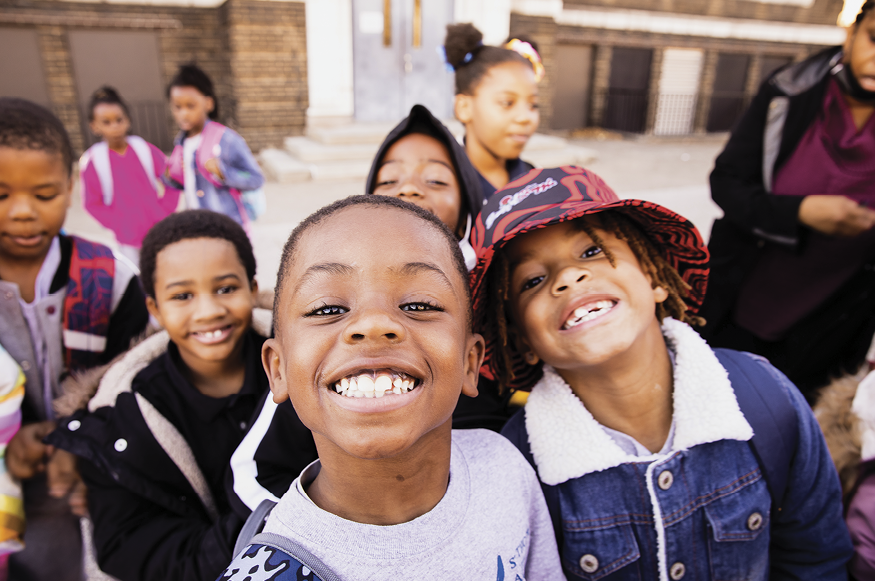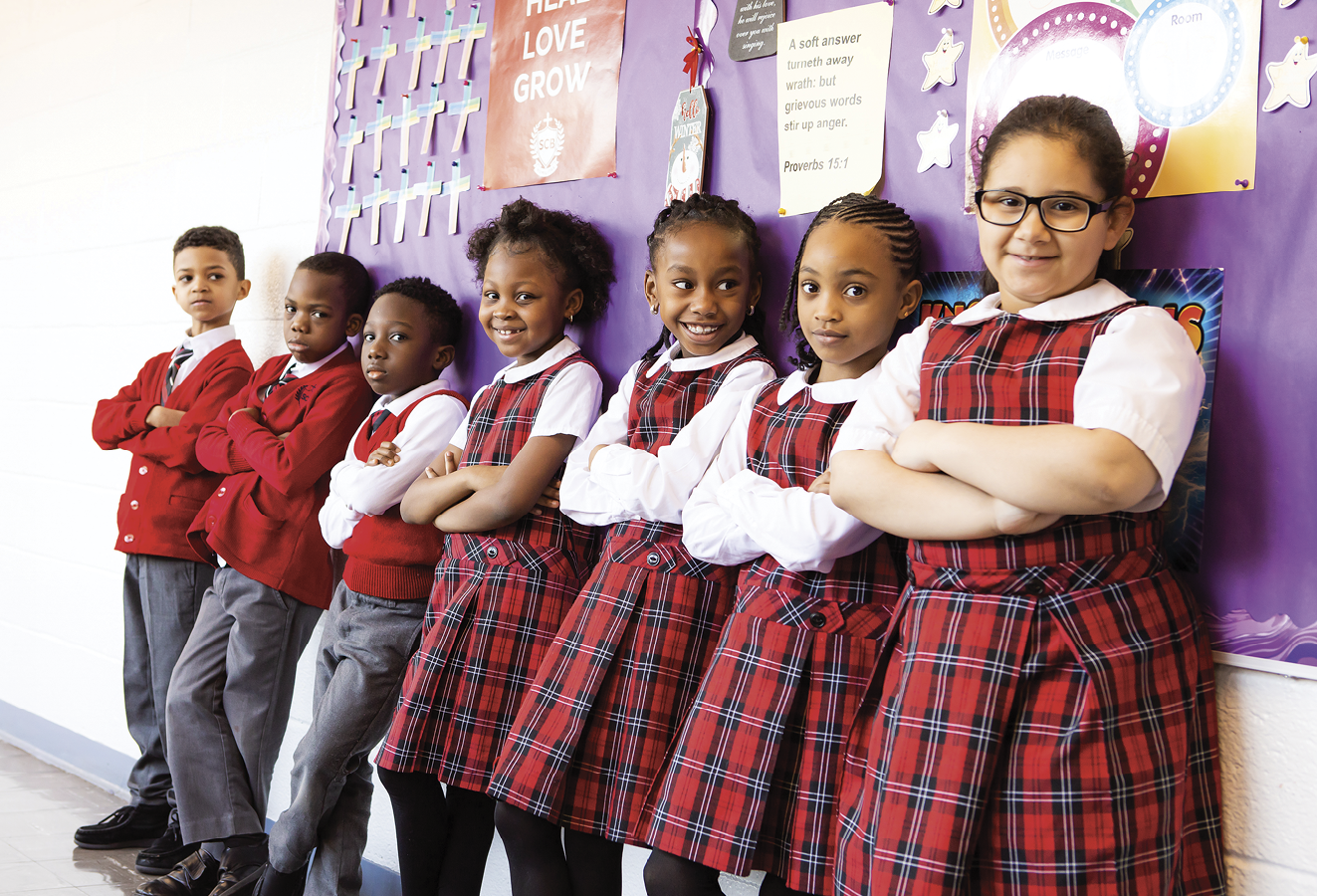- Home
- Media Kit
- MediaJet
- Current Issue
- Past Issues
- Ad Specs-Submission
- Reprints (PDF)
- Photo Specifications (PDF)
- Contact Us
- PRIVACY POLICY
- TERMS OF USE
![]()
ONLINE
![]()
ONLINE

Deeply Innovative
and Highly Traditional
Editors’ Note
Jill Kafka is the Executive Director of Partnership Schools, the nation’s first multi-city Catholic school network. Prior to the Partnership, Kafka worked in mortgage-backed securities sales and trading. She was a Partner and Senior Vice President at Arbour Financial Corporation, a Vice President at Goldman Sachs, and a Vice President at Drexel Burnham Lambert. She began her career at Andersen Consulting. Kafka holds a BS degree in computer science from Cornell.
Organization Brief
Partnership Schools (thepartnershipschools.org) is a nonprofit school management organization that runs urban Catholic schools in New York and Cleveland. Dioceses retain ownership of schools while the Partnership assumes full academic, financial, and operational responsibility. The Partnership’s schools have increased achievement and enrollment for significantly less than what public and charter schools typically spend.

Catholic school students supported by Partnership Schools
(above and below)
You left Wall Street to support Catholic schools. What attracted you to the work and how has your Wall Street experience come into play?
I volunteered for a Catholic school fundraising organization and discovered I could really impact the work of schools I came to love. It was a calling to do good for others that did my soul good too.
Because of my Wall Street experience, I am comfortable in our supporters’ world, which is fast-paced and demands clear information. It has also helped me lead the Partnership with a similar urgency. We are results-oriented; having a return on your philanthropic investment is as important as any other investment, and I bring that to the world of education.
The organization you left Wall Street to run did not manage Catholic schools – it fundraised for them. Why the change?
As a scholarship fund, we were successful; we raised $72 million and gave away scholarships to thousands of students in 50+ Catholic schools. But raising and giving away money was our work – not our mission. We set out to unlock game-changing opportunities for low-income children. Yet some students weren’t excelling, and some of the schools still closed.
Acknowledging that we could do better – even when we and the schools were already working really hard – was a tough leadership challenge. But it’s crucial for any organization in a “transform or die” moment. Transformation requires ambition for the mission, humble honesty, and courageous creativity. Fortunately, our board – led by Russ Carson – and our team had all three.
Russ and I also brought a private equity frame. At its best, private equity identifies underperforming enterprises, assumes management, and puts the right people and approach in place to maximize value. So that’s what we did; we became wholly responsible for schools and put the right people in place, like Superintendent Kathleen Porter-Magee.

What inspires the Partnership to innovate?
Many of our families have little history with Catholic schools, are determined that their children will be the first in their families to finish college, or are new to this country. Their courage and determination inspires us to run their schools with the same mindsets.
How is the Partnership solving some of the deep challenges that have stymied urban education elsewhere?
We are so proud of our teachers and students. The first generation of our students graduated in 2022, and they beat national averages in reading and math – despite characteristics that too often correlate with lower achievement, like coming from low-income households. We are able to drive that growth because we leverage together the power of a network focused on academic growth and the deep roots of Catholic schools in working-class communities.
We centralize some functions that parochial schools traditionally have not – like curriculum and operations. But Catholic schools have long-standing advantages that we also preserve, like strong community bonds; at two of our schools, those bonds go back over 150 years.
Catholic schools also have powerful autonomy. We really saw the value of trust and autonomy during the pandemic, when over 90 percent of Catholic schools returned in-person in the fall of 2020, compared with less than 50 percent of public and charter schools – and student achievement excelled as a result.
Finally, Catholic schools welcome students of all faiths and use a shared, clear language for forming values and habits as well as intellects. Parents are craving that.
“We often describe ourselves as a 170-year-old start-up; what we are doing is both deeply innovative and highly traditional.”
Catholic institutions are more known for tradition than innovation. What does it mean to lead change in that kind of environment?
Over 25 percent of Catholic schools have closed since 2000. To preserve the tradition of excellent Catholic schools in working-class communities, we must do something different. Once people see that we share the same vision Catholic schools have always had – academic excellence, caring community, and strong values – then they become more open to new strategies for pursuing it. We often describe ourselves as a 170-year-old start-up; what we are doing is both deeply innovative and highly traditional.
Some might suspect that the glory days of Catholic schools are behind us. What makes you optimistic about their future?
U.S. Catholic schools are actually at an exciting tipping point. School choice funding has expanded to 35 states, and almost half of families are looking for educational options. When our schools are strong, and when we reach out to parents to let them know “yes, you can afford this, and you are welcome,” then they come.
We see that in New York, where our enrollment is up over 25 percent since 2020. In Cleveland, where families have school choice scholarships, our enrollment rose 40 percent our first year.
The path to opportunity that runs through Catholic schools is still a powerful one.
What lessons from Partnership Schools could be useful as the entire country struggles to recover learning lost during the pandemic?
Our schools cannot afford lots of expensive remedial programming. We focus instead on meaningful learning of rich content. It sounds basic, but it’s hard. We say no to a lot so that we can focus on learning, and we support our principals and teachers in the day-to-day work to make it happen.
Our young people of all backgrounds can make meaningful progress, both academically and as caring community members, and that’s what I hope people see when they visit Partnership Schools.![]()